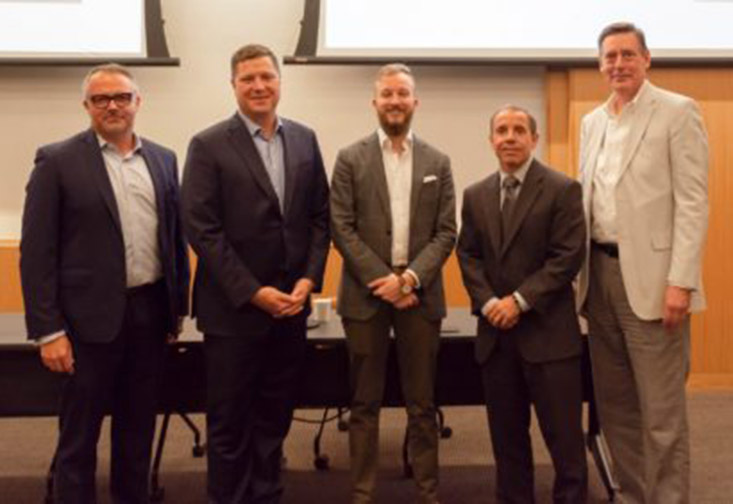USF St. Petersburg’s Kate Tiedemann College of Business (KTCOB) and the St. Petersburg Downtown Partnership hosted a panel discussion on driverless vehicles and their future in the Sunshine State last week that included State Senator Jeff Brandes and two industry leaders. The panel was part of the ongoing Sunny Side Up speaker series, which seeks to inspire and educate the community on new technologies and possibilities for the city of St. Petersburg.
Florida is paving the road towards a future with self-driving vehicles, thanks in part to support from the state legislature. Having served as a transportation officer in the United States Army Reserve, Brandes quipped about one thing that would have made his convoys better: “If I wasn’t in them.”
As a state senator, Brandes now advocates for advanced automotive technologies, such as autonomous driving and electrification, by backing bills that make it easier for companies to test their technology in Florida. These technologies have the potential to save money and lives, Brandes explained, while helping the Sunshine State reach sustainability goals.
“[Autonomous vehicles] are going to have pretty radical implications,” Brandes said.
Self-driving software company Voyage aims to capitalize on the state’s friendliness to driverless vehicles. The company recently began a pilot program at The Villages retirement community, where it has given residents dozens of autonomous passenger rides.
“Our goal is to provide transportation to those who need it in a geographically underserved area,” Dean Bushey said, Florida General Manager for Voyage.

Florida made an ideal testing ground for Voyage thanks to the state’s good weather conditions, flat terrain and economic advantages.
Bushey added some residents have deemed the autonomous rides boring, since self-driving vehicles don’t speed, honk or exhibit road rage.
“But boring is what we’re aiming for,” he said. “It’s intentionally very boring and safe.”
For Starsky Robotics, the focus is on disrupting the long-haul trucking industry. The company has developed a hybrid approach to trucking that uses a human driver, who controls the truck from a remote location, until the vehicle enters a highway and an autonomous system takes over. In February 2018, a Starsky truck completed a seven-mile trip on a Florida highway without a driver on board.
Starsky hopes to soon make autonomous trucks a regular feature of the road.
“We aren’t building cars to be on every roadway in every situation,” Kam Simmons said, Director of Public Policy for Starsky Robotics. “We’re looking at very specific use cases.”
About 75 people attended the panel discussion, which included questions from the audience about the safety implications of driverless vehicles and when these vehicles might become more prevalent on roadways. Simmons estimated that Starsky’s autonomous trucks will be seen in limited cases as soon as the end of 2020.
Through its Sunny Side Up speaker series, KTCOB and the St. Petersburg Downtown Partnership has brought together industry experts and policy makers to discuss and re-imagine the future of St. Pete. Past panels have discussed topics like healthcare and technology.
